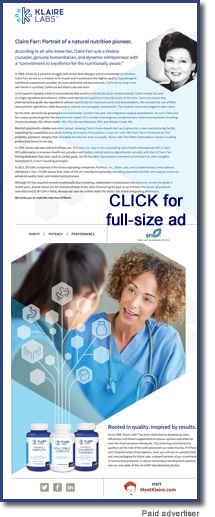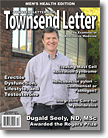Page 1, 2, 3
Blood Flow
Ultimately, erectile function is really about a blood flow problem. If nervous system function is good and testosterone levels are adequate but blood flow is compromised, then erections are compromised.
For younger guys who are fit and not overweight, blood flow is likely not the primary issue. However, it will always be involved, which is why erection drugs work.
Erection issues in older men, overweight men, and those with metabolic syndrome or diabetes, however, are almost always about blood vessel issues. High blood sugar, high blood pressure , and inflammatory mechanisms are highly damaging to the cells lining the blood vessels. These are the same cells that are functioning through NO and cGMP.
This is why lifestyle effects are so critical to men. Most men jump to testosterone and erection drugs, but studies show complete restoration of erections in men as old as eighty when lifestyle is corrected.2
Erection issues are early warning signs of cardiovascular disease. Fixing the issue at this stage requires a complete overhaul of diet and lifestyle, including weight loss, decreased sugar and carb intake, weight training, stress reduction, and more.
Unless you want to be reliant on erection drugs the rest of your life (which become less effective over time if you don't correct the underlying issue) and you don't want to die of a heart attack or stroke, then change your lifestyle: eat right and manage stress.
Taking testosterone therapy in the context of an unhealthy lifestyle won't produce the expected results.
 Lifestyle, Testosterone, and Erections Lifestyle, Testosterone, and Erections
For most men under the age of fifty, not overweight, and no high blood pressure, the issue is likely brain or biochemistry related and NOT blood flow related. This is exactly what I was suspecting with my friend. One of the first things you will see in men with low testosterone is a lack of morning erections. Testosterone is usually at play here, as this is often a first warning something is up and a great biofeedback tool to measure progress with therapies. If the morning erections come back, this is a good sign.
I realize most men will want to jump right to testosterone replacement therapy, but not so fast. The thing you need to understand about hormones is that they work in symphony. You can't simply throw testosterone into the mix and expect it to fix the issues. Hormones work in context. They are like people and behave differently depending on the environment they are in. Make sure the overall biochemistry is optimized through lifestyle if you want testosterone to work correctly.
In other words, the first step is to live a testosterone supportive lifestyle. The things that raise testosterone are the following:
- Adequate macronutrient intake – in other words, enough but not too much protein, fat, and carbohydrate.
- Adequate calorie intake – not too much and not too little.
- Adequate intake of micronutrients. The three most important for testosterone may be zinc, magnesium, and vitamin D. Being low in any of these will compromise testosterone levels. Adding these in, if you already have adequate amounts, will likely do nothing but correcting deficiencies will.
- Weight training and intense exercise. Lifting weights reliably stimulates testosterone. Intense exercise, that is high volume and heavy loads, is best.
- Enough, but not too much, exercise.
- Lots of walking, since this sensitizes the body to insulin and lowers the stress hormone cortisol – both of which, indirectly and negatively, impact testosterone.
Diet and Exercise
Since the hypothalamus is essentially a stress barometer, you do not want to train too hard, too often, or for too long. You also don't want to go to dietary extremes by cutting calories and/or carbs too low. Do enough, but not too much; otherwise you risk downstream, negative effects flowing from a dysfunctional hypothalamus, which is severely and negatively impacted by insulin resistance and excess cortisol.
Blood sugar management and insulin sensitivity are critical to testosterone. There is a hormone called SHBG (steroid hormone binding globulin) that binds very strongly to testosterone, effectively removing it from the usable pool of hormones. Insulin resistance and excess cortisol both elevate SHBG. The end result is a reduction in usable testosterone, even when you are making enough. Also, excess cortisol and insulin have many other negative effects that disrupt metabolic function.
There are two dietary regimes I find useful as "off the shelf" advice for testosterone management: the 40-30-30 dietary regime for heavy exercisers and athletes and the 30-40-30 regime for everyone else. These formulas dictate the carb-protein-fat macronutrient ratios that I start most men out with. If men are overweight, I suggest a calorie intake that can be calculated by multiplying your body weight times 10. For those training heavily, the body weight multiplied times 15 is a good starting point. So, to reiterate:
- Calorie intake equal to 10 times body weight and a 30-40-30 diet for overweight, less active men; and
- Calorie intake equal to 15 times body weight and 40-30-30 ratio for all men engaged in frequent, intense exercise.
All guys dealing with this issue should be walking daily (best insulin sensitizer and cortisol lowering behavior), and lifting weights at least three times per week (testosterone promoter).
Remember, it is a mistake to take these kinds of rules as gospel. Use these as a starting place only. Adjust based on three factors:
- Are your hunger, energy, cravings and other hormonal feedback (i.e. libido and erection quality) improving?
- Is your body composition achieving the V-Shape? (See http://www.metaboliceffect.com/me-shape-calculator/ )
- Are your blood labs (especially free testosterone, total testosterone and SHBG levels) improving?
If all the above is true, then you are on the right track.
Testing and Labs
Once you get the diet and exercise under control, you want to make sure you get baseline labs. The labs recommended are the following:
- Testosterone (total and free),
- SHBG (if this is high to start with, diet and stress will need to be priority),
- High sensitivity estrogen (to rule out high aromatase. Some men aromatize testosterone to estrogen),
- Hemoglobin A1C (rule out high blood sugar and diabetes),
- Fasting Insulin (rule out insulin resistance),
- DHEA Sulfate (if low, supplementing can restore erectile function in 80%), and
- Vitamin D.
These should be done in addition to the general screening of lipids, CBC, and chem panel a doctor will do. Zinc and magnesium are also worth noting here; but since so many people are deficient and their supplementation has little risk, taking the supplement, ZMA, is likely wise and precludes the need for testing.
Research on things like horny goat weed, Longjax, and ForsLean, as well as other herbs and compounds, have little research supporting their use; and I personally have seen them as essentially useless clinically.
You can have these labs done directly at www.directlabs.com/metaboliceffect and www.CHEKD.com/metaboliceffect, both of whom I recommend. CHEKD.com is a great resource to manage all your concerns, from testing to replacement.
Some supplements you may want to consider include the following:
- DHEA, if DHEA sulfate is low. In one study, 50 mg DHEA restored erectile function in upwards of 80% of males who were low.3
- Vitamin D. Low vitamin D has been shown to impact testosterone, and restoring Vitamin D to levels between 50-100 ng/ml may raise testosterone; and it may help erections.4
- Citrulline malate. This is an amino acid that is a NO precursor and can act as a weak Viagra, assuring NO is abundant; 1.5g/day improved erections in men within one month.5
- Rhodiola rosea. This one is controversial, but I have personally seen it be effective. There are also, supposedly, some old Russian studies showing its benefit. I was never able to find the actual article/book that outlines these studies, but the reference is Rhodiola rosea is a valuable medicinal plant (Golden Root) (Saratikov, et al. Tomsk, Russia: Tomsk State University Press; 1987). I have seen people reporting that rhodiola increased testosterone, libido, and erection quality. Given rhodiola's favorable effects on the hypothalamus, this makes sense. Although most of the people I have seen respond were doing other things too, I can't say for sure this is effective; but, if you were my good friend, I would encourage you to take it (200-400 mg a day). It may also help premature ejaculation (makes sense given it is an adaptogen balancing the parasympathetic and sympathetic nervous system).6
Hormonal Approaches to Raising Testosterone
Okay, we are finally here. What happens if, when you test your levels, they are low? And, what is considered low? Most standard references for testosterone ranges are the following:
- Total testosterone normal = 300-1200 ng/dl (Many practitioners will treat if levels are below 500, and you have symptoms.)
- Free testosterone = 5-21 ng/dl
My recommendation is that a free testosterone below 10 and a total testosterone below 500 with testo-sterone-related symptoms, especially loss of morning erection, should be managed with the lifestyle changes and supplements listed above.
If there is no change after three months of concerted effort, then, and only then, consider testosterone replacement therapy (TRT). Keep in mind at this point that there is a difference between replacing testosterone and enhancing with testosterone.
When you do TRT, you are restoring normal levels, not trying to exceed them. Replacing to normal levels is not only beneficial for symptoms but, likely, one of the healthier things you can do.
Enhancing with testosterone by going over 1200 ng/dl is not necessary and may cause some issues. Remember, what you want when restoring testosterone is to bring your levels back to optimal and help the hypothalamus-pituitary-gonadal axis become healthier. Raising testosterone to levels beyond physiological works against this goal.
If levels are low right out of the gate, you have two options: (1) HCG monotherapy (and/or Clomid) and (2) testosterone replacement. One I prefer over the other.
Page 1, 2, 3 |
![]()
![]()
![]()
![]()





